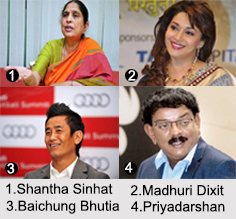 Padma Shri Awardees are those people who have received Padma Shri, the fourth highest civilian award in India. This award covers various fields. Some of the awardees and their respective fields are mentioned below.
Padma Shri Awardees are those people who have received Padma Shri, the fourth highest civilian award in India. This award covers various fields. Some of the awardees and their respective fields are mentioned below.
Padma Shri Awardees (1954-1959)
Some of the Padma Shri Awardees from 1954 to1959 are Asha Devi Aryanayakam (Public Affairs), Surinder Kumar Dey (Civil Service), Mathura Das (Medicine), Akhil Chandra Mitra (Science and Engineering), K. Shankar Pillai (Literature and Education), Zarina Currimbhoy (Social Work), Atma Ram (Trade and Industry), Sudhir Khastgir (Arts) and Balbir Singh (Sports).
Padma Shri Awardees (1960-1969)
Some of the Padma Shri Awardees from the decade 1960 to1969 are Nanabhai Bhatt (Social Work), Kartar Singh Dewana (Science and Engineering), Bismillah Khan (Arts), Premendra Mitra (Literature and Education), Gyan Singh (Sports), Shridhar Sharma (Medicine), Kruthartha Acharya (Trade and Industry), Bishnupada Mukerjee (Civil Service) and Rustomji Marwanji Alpaiwala (Public Affairs).
Padma Shri Awardees (1970-1979)
Some of the Padma Shri Awardees from the decade 1970 to 1979 are Meena Shah(Sports), Rangaswamy Narasimhan (Civil Service), Siyaram Tiwari (Arts), Janaki Ammal (Science and Engineering), Badal Sarkar (Literature and Education), Ijwant Singh (Public Affairs), Jamshed Vazifdar (Medicine), Phul Chand (Trade and Industry) and Swami Pranavananda (Social Work).
Padma Shri Awardees (1980-1989)
Some of the Padma Shri Awardees from the decade 1980 to 1989 are Hari Krishan Jain (Science and Engineering), K. Vardachari Thiruvengadam (Medicine), Kalim Ajiz (Literature and Education), Vijay Amritraj (Sports), Ganga Devi (Arts), Krishan Dev Bali (Civil Service), Ratnappa Kumbhar (Social Work), Valmiki Choudhary (Public Affairs) and Kiran Mazumdar (Trade and Industry).
Padma Shri Awardees (1990-1999)
Some of the Padma Shri Awardees from the decade 1990 to 1999 are Mohammad Swaleh Ansari (Trade and Industry), Rakesh Bakshi (Science and Engineering), Shiny Abraham (Sports), Chittu Tudu (Arts), B. N. Goswamy (Literature and Education), Homi J. H. Taleyarkhan (Public Affairs), Chewang Phunsog (Civil Service), Shantha Sinha (Social Work),
Padma Shri Awardees (2000-2009)
Some of the Padma Shri Awardees from the decade 2000 to 2009 are Vipin Buckshey (Medicine), Madhuri Dixit (Arts), Mohammad Ahmed Zaki (Civil Service), Sarvagya Singh Katiyar (Science and Engineering), Pritam Singh (Literature and Education), Baichung Bhutia (Sports), Teesta Setalvad (Public Affairs), Sudha Varghese (Social Work), Naina Lal Kidwai (Trade and Industry).
Padma Shri Awardees (2010-2017)
Some of the Padma Shri Awardees from 2010 to 2017 are Priyadarshan (Arts), Kunjarani Devi (Sports), Waikhom Gojen Meitei (Literature and Education), Sarungbam Bimola Kumari Devi (Medicine), Tokheho Sema (Public Affairs), Vijay Prasad Dimri (Science and Engineering), Alluri Venkata Satyanarayana Raju (Trade and Industry), Pravin H. Parekh (Public Affairs) and Uma Tuli (Social Work).






